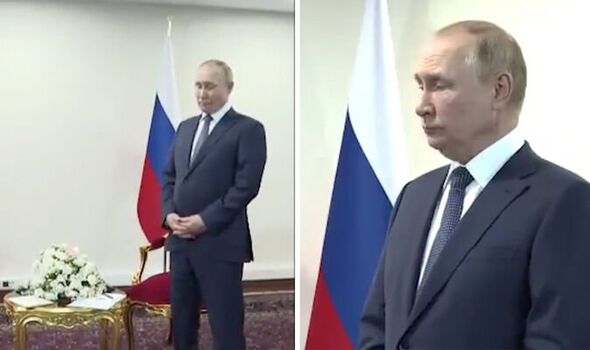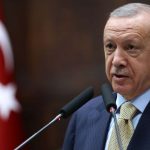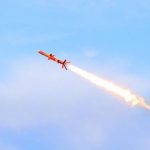Vladimir Putin’s first trip outside the former Soviet Union since the start of the Ukraine war was supposed to project power. Instead the Russian president appears to have been left red-faced at a summit in Iran this week after his Turkish counterpart, Recep Tayyip Erdoğan, left him waiting in front of the TV cameras.
For almost a minute, the man who started Europe’s bloodiest conflict in decades didn’t know where to look as he waited, shifting awkwardly on his feet and pressing his tongue into his cheek, with only the click of camera shutters cutting through the excruciating silence.
The irony of the encounter hasn’t been lost in Turkey, where commentators are openly speculating that it amounts to payback. Two years ago, on a visit to the Kremlin, Erdoğan was stood up for close to two minutes before Putin arrived for bilateral talks. Russian state media broadcast and rebroadcast the awkward moment, with one outlet even adding a timer to underline the slight.
Now though it seems the balance of power has changed. One of the reasons Putin was in Tehran, US intelligence officials say, was to broker a deal to buy ‘hundreds’ of Iranian attack drones, which Russia hasn’t been able to manufacture domestically. Ukraine has used the unmanned aerial vehicles with devastating effectiveness, destroying hundreds of Russian tanks and raining down death on its battlefield commanders from the skies.
Kyiv owes its technological supremacy to Turkey, which has provided it with dozens of the low-cost, high-tech Bayraktar TB2 drones that now have a fearsome reputation in the war. The chief engineer at the firm behind them is Selçuk Bayraktar – who just happens to be Erdoğan’s close confidante and son in law.
Since the bombs started falling, Turkey has played a key role in swinging the balance of power on the battlefield, but also has pulled no punches around the negotiating table. Ankara has played host to the only substantive peace talks held so far, calling on Moscow to do a deal and end the fighting. It has also held the Kremlin’s feet to the fire over the blockade of Ukrainian grain ports that have seen food prices skyrocket across Europe and much of Africa.
Despite being a Nato member itself, Turkey’s historically close links with Russia have led many to wonder which side it is really on. But with billions of pounds worth of investments in Ukraine and reports that it has been receiving cheap, stolen grain from Russia even as talks over food exports continue, it is clear Erdoğan that is only really out for himself. Given how effectively he has taken advantage of the circumstances, it is little wonder he doesn’t seem worried about making a good impression on Putin.
Ankara is also taking advantage of Russia, and the rest of the world, being distracted by the war in Ukraine in other ways. It has supported its close ally, Azerbaijan, against Armenia in the disputed region of Nagorno-Karabakh, where Moscow’s peacekeepers had been deployed to maintain the status quo. In north-west Syria, Turkey is pushing ahead with a new offensive, despite objections from the Kremlin, which backs the government of Bashar al-Assad.
Putin’s Iranian visit had been part of a bid to show Moscow isn’t isolated on the world stage, and still commands respect outside of the West. In reality though, Russia is finding fewer and fewer of its former partners are prepared to do deals, after China and a number of Central Asian nations refused to help it beat the sanctions imposed since the start of the invasion of Ukraine.
At the St Petersburg Economic Forum last month – once the symbol of the country’s ‘open for business’ attitude – few foreign firms were in attendance. Instead, Afghanistan’s Taliban were hailed as guests of honour. Worse still, sitting alongside Putin on stage, Kazakh President Kassym-Jomart Tokayev snubbed Moscow and said his country would continue to recognise the Russian-held Donbass as part of Ukrainian territory.
Now the list of those Putin can count as friends is rapidly diminishing. At a vote in the UN earlier this year, only four other countries voted against a motion condemning Russia for its aggression – Belarus, North Korea, Eritrea and Syria. As a major trade partner with a voice inside Nato, the Kremlin can’t afford a split with Erdoğan, and has little choice but to let him get what he wants from the Black Sea to the Caucasus.
Turkey’s growing influence isn’t just a headache for Putin though. The threat to block Sweden and Finland joining Nato last month, unless the two Scandinavian countries agreed to a deal on the extradition of purported Kurdish ‘terrorists,’ shows its influence cuts both ways. But, intent on ploughing a middle course between the East and the West, for now it seems that those on both sides need to keep Erdoğan happy.
By: Gabriel Gavin
Source: The Spectator



